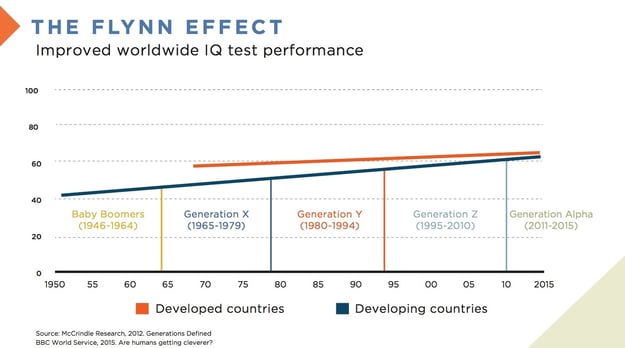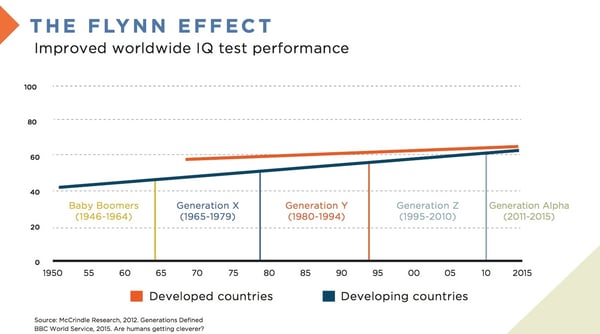Foresights and ideas that expand minds and inspire a change of heart.

IQ levels are increasing across the world according to the researchers Peera Wongupparaj, Veena Kumari and Robin Morris at Kings College London. Their research support "The Flynn Effect" which is the idea that every generation scores higher on IQ tests than the generation before it. Can this be true? Are we actually getting smarter for every generation?
The researchers Peera Wongupparaj, Veena Kumari and Robin Morris analysed data from 405 previous studies, and in total they gathered IQ test data from more than 200,000 participants from 48 countries. The result of their extensive research suggest that the average intelligence has increased with 20 IQ points since 1950.
The result of their extensive research suggest that the average intelligence has increased with 20 IQ points since 1950.
IQ has thanks to improved education and teaching methods increased more in developing countries than in developed nations. In some countries like the U.K. the average IQ has actually declined. This research confirms the Flynn Effect, which was created by philosopher and psychologist James Flynn, who is curently based at the University of Otago in New Zealand. Flynn studied IQ test scores for a range of different populations over a 60 year period of time and found that the scores increased for every generation. His research indicate that our ability to solve abstract problems, which often is defined as fluid intelligence, has expanded significantly since the 1930s.
We've gone from people who confronted a concrete world and analyzed that world primarily in terms of how much it would benefit them to people who confront a very complex world, and it's a world where we've had to develop new mental habits, new habits of mind, said James Flynn in this TED-talk.

Moreover, Flynn concludes that today's professions are more cognitively demanding compared to the common professions around the year 1900. Back then only 3% of Americans had jobs that were cognitively demanding, and today around 35% of Americans have professions that demands problem solving and analytical and abstract thinking. Flynn argues that we can only live up to the demands of employment in the modern world by being intellectually more flexible.
Flynn argues that we can only live up to the demands of employment in the modern world by being intellectually more flexible.
After reading and researching about the Flynn Effect I've begun to ask myself if this theory will be relevant in a future where artificial intelligence have replaced a significant part of both blue- and white-collar jobs. What happens when intelligent machines can solve all of our difficult and challenging tasks? Will our cognitive capacity regress as a result of this? I hope and believe that this will not be the case, instead, I think that we as humans will always crave experiences that stimulate our critical thinking, problem solving and creativity.
For further reading about this subject check out these articles:
Are humans getting cleverer? BBC News
Are smart people getting smarter? Wired.com

Header Text
Lorem ipsum dolor sit amet, consectetur adipiscing elit, sed do eiusmod tempor incididunt ut labore et dolore magna aliqua. Ut enim ad minim veniam, quis nostrud exercitation ullamco laboris nisi ut aliquip ex ea commodo consequat. Duis aute irure dolor in reprehenderit in voluptate velit esse cillum dolore eu fugiat nulla pariatur.
Lorem ipsum dolor sit amet, consectetur adipiscing elit, sed do eiusmod tempor incididunt ut labore et dolore magna aliqua. Ut enim ad minim veniam, quis nostrud exercitation ullamco laboris nisi ut aliquip ex ea commodo consequat. Duis aute irure dolor in reprehenderit in voluptate velit esse cillum dolore eu fugiat nulla pariatur.
Lorem ipsum dolor sit amet, consectetur adipiscing elit, sed do eiusmod tempor incididunt ut labore et dolore magna aliqua. Ut enim ad minim veniam, quis nostrud exercitation ullamco laboris nisi ut aliquip ex ea commodo consequat. Duis aute irure dolor in reprehenderit in voluptate velit esse cillum dolore eu fugiat nulla pariatur.

Header Text
Lorem ipsum dolor sit amet, consectetur adipiscing elit, sed do eiusmod tempor incididunt ut labore et dolore magna aliqua. Ut enim ad minim veniam, quis nostrud exercitation ullamco laboris nisi ut aliquip ex ea commodo consequat. Duis aute irure dolor in reprehenderit in voluptate velit esse cillum dolore eu fugiat nulla pariatur.
Lorem ipsum dolor sit amet, consectetur adipiscing elit, sed do eiusmod tempor incididunt ut labore et dolore magna aliqua. Ut enim ad minim veniam, quis nostrud exercitation ullamco laboris nisi ut aliquip ex ea commodo consequat. Duis aute irure dolor in reprehenderit in voluptate velit esse cillum dolore eu fugiat nulla pariatur.
Lorem ipsum dolor sit amet, consectetur adipiscing elit, sed do eiusmod tempor incididunt ut labore et dolore magna aliqua. Ut enim ad minim veniam, quis nostrud exercitation ullamco laboris nisi ut aliquip ex ea commodo consequat. Duis aute irure dolor in reprehenderit in voluptate velit esse cillum dolore eu fugiat nulla pariatur.

Header Text
Lorem ipsum dolor sit amet, consectetur adipiscing elit, sed do eiusmod tempor incididunt ut labore et dolore magna aliqua. Ut enim ad minim veniam, quis nostrud exercitation ullamco laboris nisi ut aliquip ex ea commodo consequat. Duis aute irure dolor in reprehenderit in voluptate velit esse cillum dolore eu fugiat nulla pariatur.
Lorem ipsum dolor sit amet, consectetur adipiscing elit, sed do eiusmod tempor incididunt ut labore et dolore magna aliqua. Ut enim ad minim veniam, quis nostrud exercitation ullamco laboris nisi ut aliquip ex ea commodo consequat. Duis aute irure dolor in reprehenderit in voluptate velit esse cillum dolore eu fugiat nulla pariatur.
Lorem ipsum dolor sit amet, consectetur adipiscing elit, sed do eiusmod tempor incididunt ut labore et dolore magna aliqua. Ut enim ad minim veniam, quis nostrud exercitation ullamco laboris nisi ut aliquip ex ea commodo consequat. Duis aute irure dolor in reprehenderit in voluptate velit esse cillum dolore eu fugiat nulla pariatur.
& STAY UP TO DATE WITH FORESIGHTS AND TREND REPORTS!
WE WILL EQUIP YOU WITH THE VIDEOS AND MATERIALS YOU NEED TO SUCCESSFULLY PITCH ASN.
0 Comment